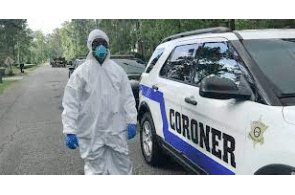What are the duties of a coroner? A coroner is a county authority chosen by the people in their area who is charged with determining the cause of death. In cases when the death is unexpected and abrupt, a coroner may be called in. It’s normally left to a coroner to assess whether or not a death was caused by foul play. A coroner has a wide range of duties, and this article examines the qualities required to become one.
Here we will tell you everything regarding a coroner as well as how to become a coroner.
What does a coroner do?
Examinations of the dead are conducted by the coroner in order to identify those responsible for a suspicious or unexpected death. Those who die alone or without medical assistance are also looked at. As part of their investigation into how a person died, coroners work with a team of pathologists, chemists, toxicologists, investigators, and doctors to examine crime scenes and death scenes itself. Other usual roles of a coroner vary according on state laws and regulations, however here are a few examples:
- Keeping records of death certificates
- Testifying on findings in court proceedings
- Ordering autopsies
- Notifying family or arranging for notification
- Interviewing witnesses and family members
- Identifying the deceased
- Gathering medical histories of the deceased
- Getting death reports from law enforcement detectives or physicians
- Monitoring and collecting evidence
- Completing and signing death certificates to verify time, date and cause of death
- Determining the cause of death
- Initiating investigations at crime scenes
How to become a coroner
You might be thinking about how to become a coroner. Each state has its own requirements for becoming a coroner. Even yet, coroners must have a degree, ideally in medicine, criminology, or a related discipline, in order to perform their duties. To become a coroner, there are three steps:
1. Earn high school diploma
To be considered for this job, one must have a strong foundation in the basic areas of English, mathematics, physics, and history. Preparation should begin early and include taking challenging courses. Consider taking advanced credit and college preparatory classes that concentrate on science and math. Courses in anatomy, physiology, and health care basics are all available in certain high school curricula. All of them will help you prepare for college classes and get you acquainted with the subject.
2. Completing an appropriate college degree program
One of the natural sciences will be required for a bachelor’s degree in a coroner’s field. Graduate school may also be an option for you. List of colleges and universities that offer forensic science degrees may be found on the AAFS’ website. This may take between 4 and 8 years, depending on the educational path taken, in order to become an official coroner in various jurisdictions.
3. Earn certifications
The American Board of Medicolegal Death Investigators (ABMDI) may require coroners to become certified death investigators. The two certifications offered by this organization are:
Registry certification (basic)
Your skill in conducting a death investigation is shown by the completion of your first certification. At least 18 years of age, with a diploma or equivalent and at least 640 hours of investigation experience of the death scene are required to sit for this test and become certified as a medical examiner or coroner. A certification number will be supplied to you after passing the exam.
Board certification (advanced)
It is required that you meet all of the requirements for registry certification and you have at least an associate’s degree and a certain number of hours of investigation experience to be eligible for advanced board certification. Employers may verify your qualifications by using your certification number, which you will get upon completion of the course.
4. Develop important skills and traits
They have to deal with sensitive information and circumstances on a regular basis. For success in this field, one must possess a specific set of skills. A coroner’s success is aided by a number of factors, including:
Curiosity
Coroners tend to be curious people who are constantly on the lookout for clues and information that might assist them better comprehend a situation or a person. They prefer to seek knowledge from a variety of sources and depend largely on facts.
Attention to detail
A coroner’s comprehension and study are aided by focusing on the tiniest facts. As a coroner, attention to detail can help you fulfill deadlines, put together facts throughout an investigation, and communicate effectively with people.
Critical thinking
If a coroner wants to do his or her job well, they must be able to think critically, be able to see inconsistencies and contradictions in evidence, and be able to articulate their thinking and solve complex problems.
Communication
Coroners must be able to communicate effectively in both written and spoken form in order to lead a team of investigators and adequately explain the investigative process to family members. Additionally, they must be able to convey facts of a person’s death to their loved ones in a delicate and skilled manner.
Coroner requirements
Most jurisdictions require coroners to have a medical license and be doctors, however this isn’t always the case. Other usual qualifications for becoming a coroner include the following:
- Prior work experience in the medical field
- Becoming certified in forensic pathology
- Earning a physician’s license
- Successful completion of medical school
- Bachelor’s degree in criminology, medicine, forensic science or related
Types of coroners
Apart from the selection process, credentials, and experience, coroners may be classified into a number of sub-categories. Coroners are referred to as such by a variety of names:
- Medical examiner
- Legal investigator
- Forensic pathologist
- Elected county coroner
- Deputy coroner
- County coroner




